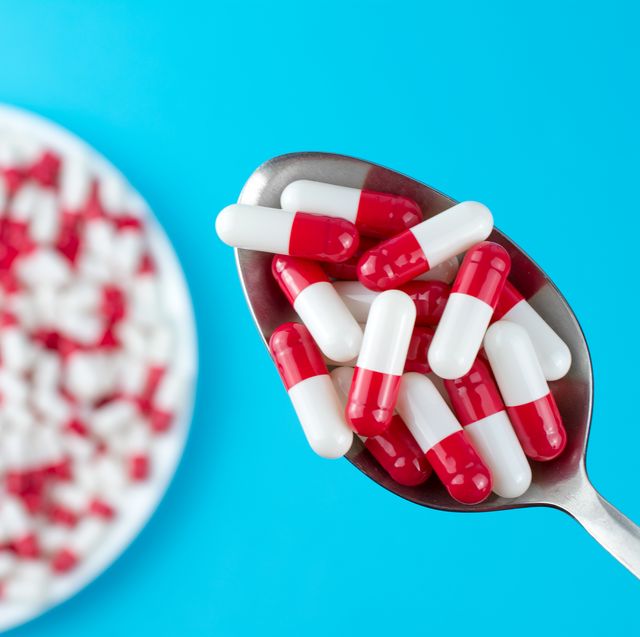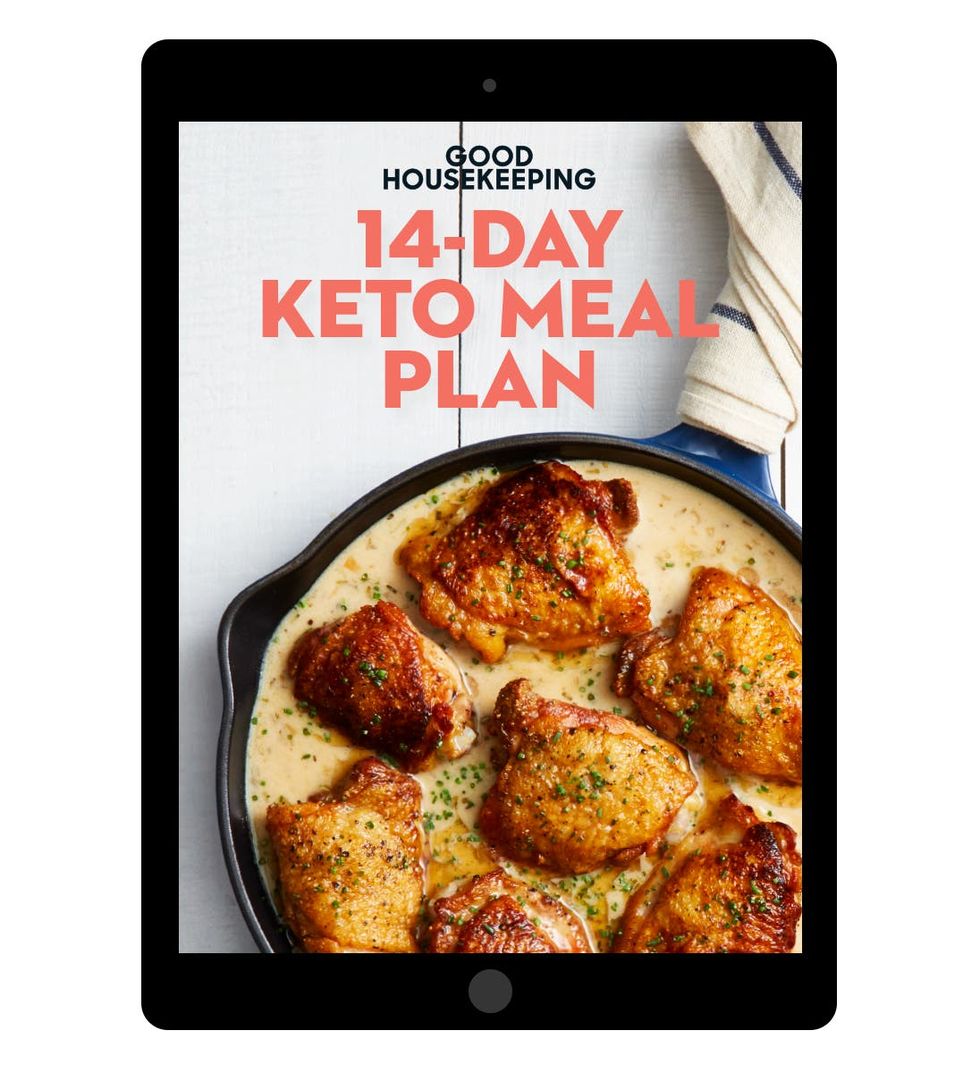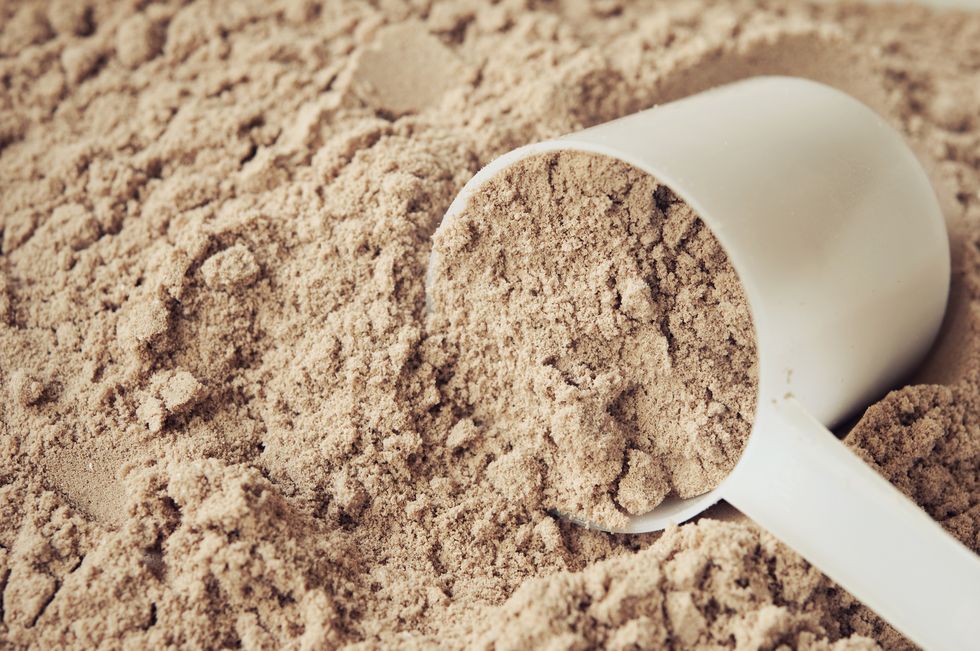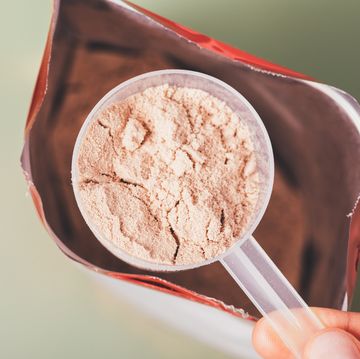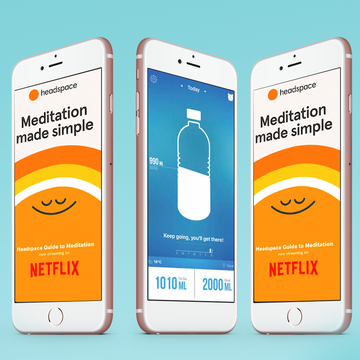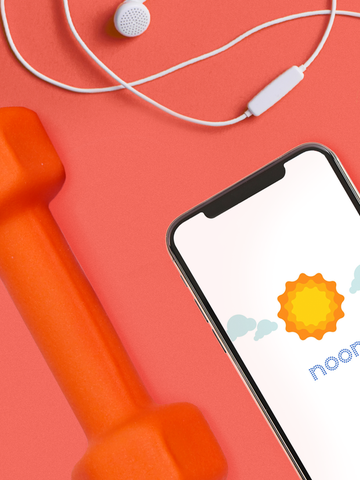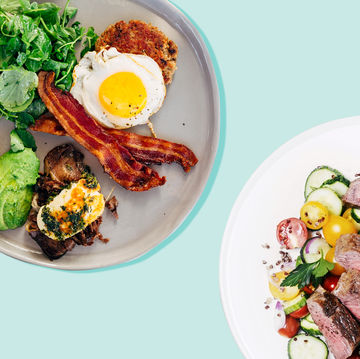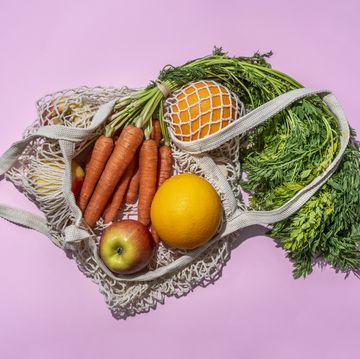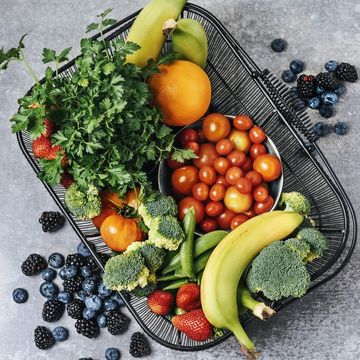January resolutions are in full swing, so you've probably heard of the ketogenic diet, the trendy eating plan that calls for getting more than 70% of your total calories from fat, about 20% from protein, and 10% or less from carbs. The whole idea is to enter a metabolic state known as ketosis, when your body burns fat for fuel.
You may have also heard about a Keto 30 Challenge, a month-long diet program marketed by KetoLogic that involves a whole slew of special supplements. Honest Keto Diet, a company recently featured on Shark Tank, sells similar weight-loss pills. Pricey keto supplements include ingredients like ketones designed to suppress appetite, electrolytes for the dehydrating effects of the diet, certain vitamins and minerals, and even caffeine.
The packaging claims are abundant too: They allege they'll help you achieve ketosis within "three days," "fuel performance," and "clear brain fog," among other benefits. The problem is that these powders and pills come at a hefty financial cost, and could have some unintended, undesirable consequences for your health.
While the keto diet gives me pause for a number of reasons (and you can read all about them here), these keto supplements worry me even more. Here's what you need to know before you spend $150 on a 30-day "challenge."
Keto supplements may mess with your metabolism.
When you’re in a starvation state, your body uses ketones for energy in a similar way to how they’re used on a ketogenic diet — for fuel — and converts them into glucose. In this state, all those ketones also stimulate an increase in leptin (the hormone that makes you feel full) and a decrease in ghrelin (the hormone that stimulates your appetite). The higher your blood concentration of ketones, the less hungry you feel. Why? Because in the history of human evolution, periods of famine forced our bodies to adjust so that you would be less likely to eat something poisonous if there was no food available to you. Here in the 21st century: Taking supplemental ketones to help enhance this biological process will likely decrease appetite by raising blood levels of ketone bodies.
What’s the catch? The ketogenic state has been linked to increasing satiety hormones and decreasing hunger hormones — well-researched during the initial phase. But once you’re off the keto diet after 30 days, the appetite-suppressing hormones will increase significantly from your baseline. Meaning that you’re likely to feel physically hungrier than you did before you started all of this dieting nonsense.
They're expensive (and you probably already have them in your pantry).
Electrolyte supplements provide sodium — sometimes up to 40% of your recommended daily intake for the day. They're typically used by athletes for endurance training, but the keto-friendly ones claim to energize you and offset the physical side effects of the keto flu.
The keto flu is host of flu-like symptoms such as aches, cramping, exhaustion, diarrhea, constipation, and general weakness experienced during the first four days the keto diet.
It's not an actual virus but the result of dehydration that occurs when switching from glucose to fat for energy. Low-carb diets generally have a diuretic effect within the first few days, meaning you lose more water and electrolytes (like potassium and sodium) in urine than normal. It happens because you're body is losing water as it turns to muscle glycogen for energy and your body’s insulin levels decrease.
Anyone who is planning on doing keto will need to drink additional fluids with electrolytes — especially in the first four days of starting — to help mitigate the increased heart rate associated with dehydration.
Ketoburn and KetoLogic do provide electrolytes in supplement form, but my gripe (beyond messing with your body’s biochemistry to the point of increasing your heart rate for no reason): Ketologic is $100 per container, Ketoburn is $40 per container, and the predominant electrolyte you’re getting in each is sodium. That means you’re literally spending up to 100 times more money than you would if you went to the supermarket and picked up a container of sodium chloride, a.k.a. table salt. It’s about $1, max.
Beating brain fog is more easily achieved with a Starbucks run.
KetoLogic also claims to beat the brain fog many people experience when they start out on keto. That makes sense since the caffeine in it is, of course, energizing! (By the way that lethargy you feel is a result of your brain not receiving enough glucose.)
While research supports the idea that consuming moderate amounts of caffeine is a good thing, the science suggests that the benefits are seen primarily in coffee and tea, two plant-based beverages with antioxidants. So while some of these supplements attempt to do the same (Ketoburn provides beta carotene), consuming supplemental forms of antioxidants simply does not have the same biochemical effect as drinking them in their most natural form. Plus, there's no guarantee that antioxidants are really in there as the FDA doesn’t regulate supplements.
And again on the $$$ front: Keto supplements with antioxidants and caffeine cost you up to 100 times more than a regular cup of coffee to get an unsubstantiated benefit, when you could just brew a pot of coffee at home.
The MCT oil in some mixes can mess with digestion.
Supplements like KetoLogic's KetoMeal and keto-friendly bulletproof coffee recipes also contain MCT oil. The acronym stands for medium-chain triglycerides, which are fat sources that take less time to digest than the long-chain triglycerides usually found in fatty foods.
MCTs are considered more "efficient" because instead of getting distributed among other organs that use these fat molecules, they go straight to your liver. This process requires more energy, which is why the oil is termed "fat-burning."
So, what are the downsides? Well, many will experience nausea, vomiting, diarrhea, and constipation as a result. Plus, unless they’re prescribed to you by a physician, dietary supplements come with their own safety gamble.
You're better off getting vitamins and minerals in real food.
Keto supplements also include important nutrients like potassium, magnesium, and calcium — but they’re in much smaller amounts than you’d get in actual produce. And since the keto diet limits fruits and vegetables, you will undoubtedly need to take a multivitamin to get enough minerals, calcium, and vitamin D.
That's the biggest concern I have about recommending keto in general. Dietary supplements aren’t overseen by the FDA, meaning that they’re not evaluated for safety and efficacy in the same way that food and medications are and you may not be getting exactly what you pay for. And if you are? Consuming certain nutrients in supplement versus food form can induce oxidative stress rather than treat it, causing more harm than good to organ tissues. The end result: increased risk of chronic disease, including heart disease and some cancers.
Since there’s limited data on long-term supplement dependence and ketogenic diets, it’s impossible to know now what effects this may have on health and weight overall. A keto-specific example: Selenium, an immune-boosting antioxidant found in plant foods, is insufficient on keto, and when left unmitigated, this can cause cardiomyopathy, a hardening of the heart muscle, leading to heart failure.
In other words, it’s not just the ketogenic diet itself that has risks; it’s the risks associated with the lack of vitamins and minerals through food sources that give health professionals pause in terms of recommending this plan.
The Bottom Line: Weight loss is highly personal, individualized, and unique to every single one of us. That said, any plan that restricts real, whole foods and requires nutrient supplementation comes at a cost. Cutting back on these nutritious foods in any way for the weight loss can propagate myths about what it looks like to eat a more practical, balanced diet. Approach weight loss first by considering your lifestyle. Eat more veggies, fruit, seafood, and whole grains; prioritize good-for-you unsaturated fats; and think inclusive versus exclusive. There's no need to replace meals with powders when you can instead make shifts toward healthier eating habits that promote physical, mental, and psychological well-being for life.

A registered dietitian with a Bachelor of Arts degree from Northwestern University and a Master of Science degree in Clinical Nutrition from New York University, Jaclyn “Jackie” London handled all of Good Housekeeping’s nutrition-related content, testing, and evaluation from 2014 to 2019. Prior to joining GH, she was a clinical dietitian at Mount Sinai Hospital. Jackie has also appeared as an expert guest on The Dr. Oz Show and The Today Show. She is also author of the book Dressing on the Side (and Other Diet Myths Debunked).
